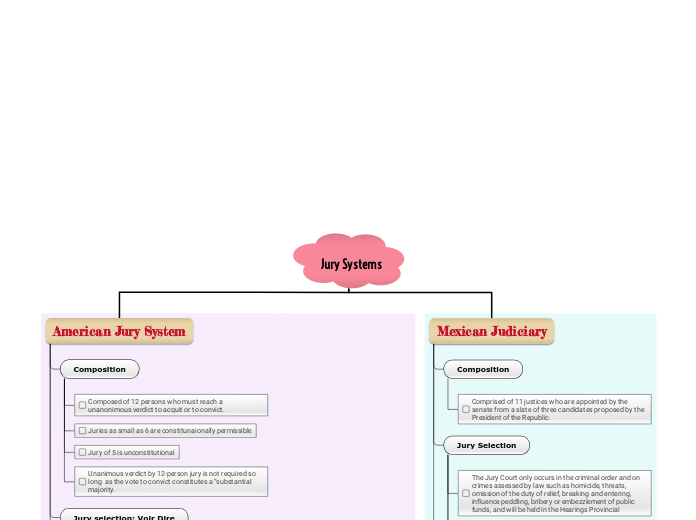Jury Systems
American Jury System
Composition
Composed of 12 persons who must reach a unanonimous verdict to acquit or to convict.
Juries as small as 6 are constitunaionally permissible
Jury of 5 is unconstitutional
Unanimous verdict by 12-person jury is not required so long as the vote to convict constitutes a “substantial majority.
Jury selection: Voir Dire
Challenges for Cause
Challenges not for Cause
Deadlocked Juries
After the jury has indicated that it has been unable to reach a verdict, the court may inquire of the jury as to the nature of the deadlock and whether further deliberations would be fruitful.
When a jury is having trouble reaching a unanimous verdict, the court may not, either expressly or impliedly, authorize the jury to render a compromised verdict.
Mexican Judiciary
Composition
Comprised of 11 justices who are appointed by the senate from a slate of three candidates proposed by the President of the Republic.
Jury Selection
The Jury Court only occurs in the criminal order and on crimes assessed by law such as homicide, threats, omission of the duty of relief, breaking and entering, influence peddling, bribery or embezzlement of public funds, and will be held in the Hearings Provincial
Only the popular jury is foreseen, at the federal level, to intervene in criminal proceedings for crimes committed through the press against public order or the external or internal security of the nation
The jury of qualification, which the law calls de facto judges, would decide by an absolute majority of votes if an accusation is founded or not, notifying the decision to the corresponding City Council.
Verdict
Pronouncement of the jury that occurs once the oral trial has concluded, after the reports have been produced and the accused have been heard on various legally established points, among which the facts and their assessment stand out, and the guilt or not of the accused.
The verdict may have different contents, depending on the specific legal system, but the most common is that a popular jury decides on the facts of a specific case, deciding whether or not the allegations of the parties have been proven.
Used to excuse potential jurors who are not impartial
Defense and prosecution are entitled to exercise a limited number of “peremptory challenges”
